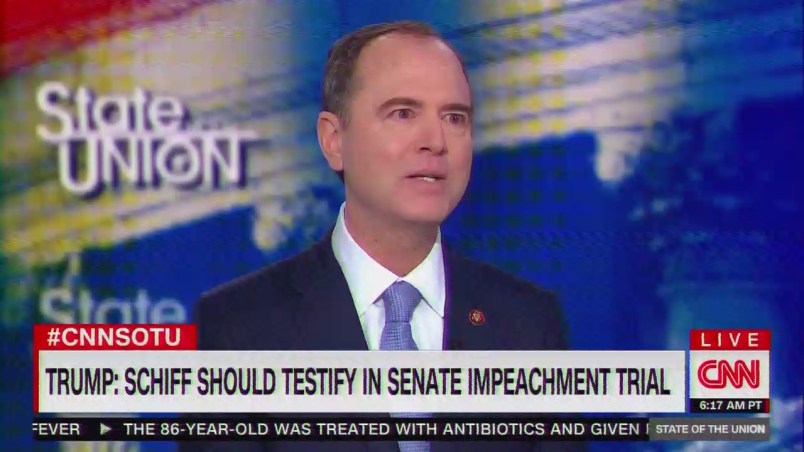It seems our former AUSA Reader was on to something when they pointed to the logic of trying to deal with subpoenaing recalcitrant witnesses at a Senate trial rather than getting slow rolled for months in the courts and possibly, ultimately getting nothing. You’ll remember that Chief Justice Roberts acts as judge in a senate trial and under Senate rules he makes all decisions on questions of evidence, relevance, subpoenas witnesses – though he can be overruled on those judgments by a majority of the Senate.
Chairman Adam Schiff appeared this morning on both the State of the Union and Meet the Press and he seemed to confirm that this is his thinking too.
From State of the Union and Jake Tapper …
TAPPER: What about the idea — I have heard this legal theory posited — that, if you took Bolton and everybody to court, Mulvaney, et cetera — and the Supreme Court has never really weighed in on whether or not such a thing — they have accommodated here and there, but they have never really made a decision about where executive privilege ends and where it begins when it comes to people in the White House testifying, being forced to testify before Congress.
It would go before the Supreme Court. Who knows how they would rule, and that’s — all of a sudden, we’re in 2020. But if you do it the way you’re doing it, which is, it goes — presuming that you impeach the president, the House Democrats vote to impeach the president, it goes to the Senate, Chief Justice John Roberts presides, and he could theoretically compel John Bolton and others to testify.
I have heard that as a legal theory as to why you’re doing it that way. Is there any merit to that?
SCHIFF: Well, I think there’s certainly merit to the idea that we may get a quicker ruling from a chief justice in a Senate trial, if it ever came to that, than we would get by going months and months on end litigating the matter.
There’s no guarantee of that, but I think that it’s entirely possible.
Ultimately, though, one thing is clear. Because we have adduced so much evidence of guilt of this president, so much evidence of serious misconduct, any privilege the president would have would be vitiated by this crime-fraud exception.
So, that will give way. And if it doesn’t, to quote my colleague Chairman Nadler, it will mean that either Justice Roberts or the Supreme Court itself is not really a conservative justice or court, merely a partisan one.
And I have to hope that that’s not the case for the country’s sake.
He was even more explicit on Meet the Press with Chuck Todd …
CHUCK TODD: And one last thing, on the Senate trial, is one of the reasons you’re not going to fight to try to — in the courts right now for Bolton is that you believe – -there’s this theory that’s been on, I think, Talking Points Memo, a liberal news organization, Josh Marshall. There’s a legal theory running around that it’s a lot easier to get the Chief Justice to compel John Bolton to testify at a Senate trial than it would be waiting around to get him to Congress. Do you buy into that theory?
REP. ADAM SCHIFF: I think that may very well be true. Now, people like John Bolton, whose deputies had the courage to come in and testify, are going to have to answer one day why they saved what they knew for a book rather than tell the country when the country needed to know. But I do think that when it comes to documents and witnesses, that if it comes to a trial, and again we’re getting far down the road here, that the Chief Justice will have to make a decision on requests for witnesses and documents.
Some readers have said this is wishful thinking: why would John Roberts of all people help out here? This is the wrong way to look at this. I don’t know how Roberts will balance his partisan leanings with institutional or ethical considerations. It’s entirely possible he’ll shut everything down in the interests of the President and the GOP. The point is more one of speed. Given his role of Chief Justice, the composition of the Court and more, all these question will ultimately fall to him, whether through the conventional appellate process or at a Senate trial. The key in a Senate trial is that the decision comes quickly and in the open. So same decision, just getting there with less delay and more people watching.
Here again is that TPM Reader email that floated the idea.






